book7unit5知识点
- 格式:ppt
- 大小:126.00 KB
- 文档页数:26


Unit5 Why do you like pandas?知识点归纳一、重点短语1. importance in Thailand 在泰国的重要性2. Let’s see…. first. 让我们先看...3. favorite animals 最喜欢的动物4. kind of interesting 有点有趣5. South Africa 南非6. be from =come from 来自7. be smart 聪明的8. walk on two legs 用两条腿走9. all day/all night 整天/整夜10. a good name for her 对于她是个好名字11. like …a lot 非常喜欢......12. black and white 黑白相间13. You’re right. 你是正确的。
14. one of +名词复数(......其中之一)15. our first flag 我们的第一面旗16. a symbol of good luck 好运的象征17. draw well 画得好18. forget to do 忘记做某事19. get/be lost 迷路20. places with food and water有食物和水的地方21. be in great danger 处于危险22. cut down 砍倒23. over = more than 超过/多于24 be made of... 由…制成25.Thai Elephant Day 大象二、用法归纳1. —Why…? 为什么……?—Because… 因为……2. let sb. do sth. 让某人做某事3. want to do sth. 想要做某事4. one of+名词复数……之一5. forget to do sth. 忘记要做某事6. forget doing sth. 忘记做过某事7. help sb. (to) do sth. 帮助某人做某事8. be friendly to sb. 对某人友好三、重点句子1. —Why do you like pandas? 你为什么喜欢熊猫?—Because they’re kind of interesting. 因为它们有点儿有趣。
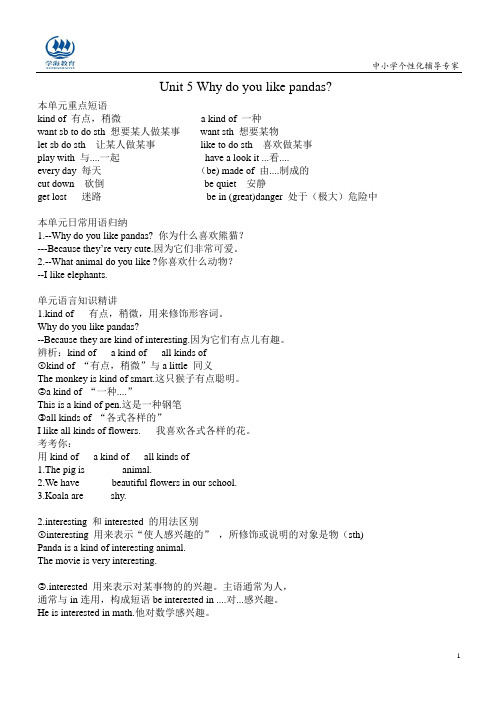
Unit 5 Why do you like pandas?本单元重点短语kind of 有点,稍微 a kind of 一种want sb to do sth 想要某人做某事want sth 想要某物let sb do sth 让某人做某事like to do sth 喜欢做某事play with 与....一起have a look it ...看....every day 每天(be) made of 由....制成的cut down 砍倒be quiet 安静get lost 迷路be in (great)danger 处于(极大)危险中本单元日常用语归纳1.--Why do you like pandas? 你为什么喜欢熊猫?---Because they’re very cute.因为它们非常可爱。
2.--What animal do you like ?你喜欢什么动物?--I like elephants.单元语言知识精讲1.kind of 有点,稍微,用来修饰形容词。
Why do you like pandas?--Because they are kind of interesting.因为它们有点儿有趣。
辨析:kind of a kind of all kinds of①kind of “有点,稍微”与a little 同义The monkey is kind of smart.这只猴子有点聪明。
②a kind of “一种....”This is a kind of pen.这是一种钢笔③all kinds of “各式各样的”I like all kinds of flowers. 我喜欢各式各样的花。
考考你:用kind of a kind of all kinds of1.The pig is _______animal.2.We have ______beautiful flowers in our school.3.Koala are _____shy.2.interesting 和interested 的用法区别①interesting 用来表示“使人感兴趣的”,所修饰或说明的对象是物(sth) Panda is a kind of interesting animal.The movie is very interesting.②.interested 用来表示对某事物的的兴趣。

七年级上册英语第七单元笔记
以下是七年级上册英语第七单元的笔记,供您参考:
1. 重点单词:
usually 通常
never 从来不
sometimes 有时
always 总是
often 经常
2. 重点词组:
do homework 做作业
watch TV 看电视
play sports 进行体育运动
read books 读书
eat dinner 吃晚饭
3. 重点句型:
What do you usually do on weekends? 你周末通常做什么? I usually do homework and watch TV. 我通常做作业和看电视。
How often do you watch TV? 你多久看一次电视?
I watch TV every day. 我每天都看电视。
4. 语法重点:
频率副词的使用,如always, usually, often, sometimes, never等。
一般现在时的使用,表示习惯性或经常发生的动作。
5. 易错点:
注意频率副词的位置,通常放在动词之前,be动词、助动词之后。
注意一般现在时第三人称单数形式,动词需要加-s或-es。
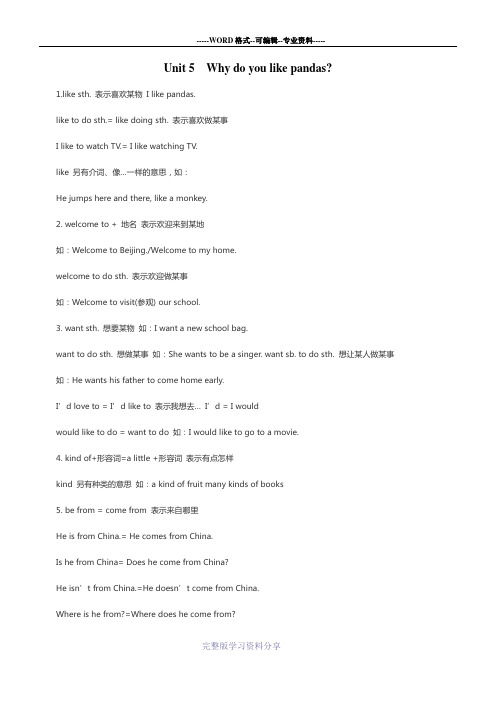
Unit 5Why do you like pandas?1.like sth. 表示喜欢某物I like pandas.like to do sth.= like doing sth. 表示喜欢做某事I like to watch TV.= I like watching TV.like 另有介词、像…一样的意思,如:He jumps here and there, like a monkey.2. welcome to + 地名表示欢迎来到某地如:Welcome to Beijing./Welcome to my home.welcome to do sth. 表示欢迎做某事如:Welcome to visit(参观) our school.3. want sth. 想要某物如:I want a new school bag.want to do sth. 想做某事如:She wants to be a singer. want sb. to do sth. 想让某人做某事如:He wants his father to come home early.I’d love to = I’d like to 表示我想去…I’d = I wouldwould like to do = want to do 如:I would like to go to a movie.4. kind of+形容词=a little +形容词表示有点怎样kind 另有种类的意思如:a kind of fruit many kinds of books5. be from = come from 表示来自哪里He is from China.= He comes from China.Is he from China= Does he come from China?He isn’t from China.=He doesn’t come from China.Where is he from?=Where does he come from?6. walk on 表示用某种方式行走walk on two legswalk on hands 倒立行走walk on knees 跪着走7. like …a lot = like …very much 非常喜欢什么like…a little 有点喜欢like …best 最喜欢8. be in (great ) danger 处于(极大的)危险中.如:Tigers are in great danger.dangerous adj.危险的如:Tigers are dangerous.9. get + 形容词常表示变得怎样了get lost 迷路get green 变绿get warm 变得温暖lost 是形容词,表示丢失了的如:a lost boy 一个迷路的男孩my lost book 我丢的书10. (be) made of…由什么制成如:Paper is made of timber(木材).11. live in + 地名表示住在某地如:I am from England, but I live in China.┃语法探究┃Ⅰ.why引导的特殊疑问句特殊疑问副词why 在句子中用来提问__________。

Unit5 名词: panda 熊猫 animal 动物 cat 猫 zoo 动物园 kind 种类flag 旗;旗帜 tiger 老虎 Australia 澳大利亚 plac e 地点;位置 elephant 大象 Africa 非洲 wate r 水 lion 狮子 pet 宠物 danger 危险 giraffe 长颈鹿 leg 腿tree 树动词:save救 cut 砍;切 forget 忘记 kill 杀死形容词:cute 可爱的;机灵的 smart 聪明的friendly 友好的 lazy 懒散的;懒惰的beautiful 美丽的;美好的 shy 害羞的;腼腆的 介词:over 超过;多于;在⋯⋯正上方兼类词 :sout h adj 南方的;n 南;南方sleepv&n 睡觉down adv (坐、躺、倒)下; prep 向下;沿着 短语:kindo f 稍微;有点儿 cutdown 砍倒SouthAfri ca 南非 bein (great )danger 处于(极大)危险之中getlo st 迷路 (be )madeof 由⋯⋯制成的知识点:1、 Let'sdosth 让我们做某事吧! Let's=LetusLet'snotdosth 让我们不要做某事!Let'sgoswimming !咱们去游泳吧! Let'splaysoccer !咱们去踢足球吧!Let'snottellhim. 咱们不要告诉他。
Let'snotplayvolleyball. 咱们不要打排球。
Let'sgoshopping!咱们去购物吧!答语:接受建议:Goodidea./Sure./OK.不接受建议:Sorry,I⋯⋯2、favorite adj.最喜爱的;特别喜爱的n.最喜欢的人或事物What'syourfavorite+ 名词?=What+ 名词+doyoulikebest?你最喜欢的⋯⋯是什么?Myfavorite+ 名词+is/are⋯⋯我最喜爱的⋯⋯是⋯⋯名词+is/aremyfavorite. ⋯⋯是我最喜爱的。

一、语法:不定代词(一)、由some, any, no, every与thing, one, body 构成的不定代词称为复合不定代词。
someone / somebody 某人something 某事;某物anyone / anybody 任何人anything 任何事物no one / nobody 无人;没有人everyone / eveybody 每人everything 每一件事物;一切nothing 没有什么1.复合不定代词作主语时,都坐单数看待,谓语动词用第三称单数。
No one knows the answer. 没有人知道这个答案。
在晚上无事可做。
There was nothing much to do in the evening.Everyone ______ ( have ) a computer in my family. 在我家每人都有一台电脑。
在春天,万物开始生长。
Everything___________ ( begin) to grow in spring.2.形容词、动词不定式等作定语修饰复合不定代词时,要放在不定代词之后。
There is nothing interesting in the newspaper.报纸上没有什么有趣的事情。
Do you want anything to drink?你想喝点什么吗?I would like something to eat. 我想要些吃的?3. 一般情况下,含有some的复合不定代词someone / somebody, something常用于肯定句,含有any的复合不定代词anyone / anybody,anything.anything常用于否定句、疑问句中代替someone / somebody, anytning表示“某人”,“某物”。
nothing = not…?你遇见了有趣的人吗?Did you meet anyonge interestingDid you buy anything special?你卖了些特别的东西吗?我有重要的事情告诉你。

人教版九年级全一册英语Unit5单元语法知识点总结本单元重点短语的具体用法1. be made of:表示某物由某种材料制成,且制成后原材料仍可辨认。
例如:- This table is made of wood. 这张桌子是由木头制成的。
2. be made from:与“be made of”意思相近,但强调制成的物品已经看不出原材料。
例如:- Paper is made from wood. 纸是由木头制成的。
3. be known for:意为“因……而闻名”。
例如:- This city is known for its beautiful beaches. 这座城市以其美丽的海滩而闻名。
4. be used for:表示某物被用于某种目的。
例如:- This tool is used for cutting wood. 这个工具是用来砍木头的。
5. no matter:“不论;无论”,引导让步状语从句。
例如:- No matter what happens, I will always support you. 无论发生什么,我都会一直支持你。
6. be covered with:表示被某种东西覆盖。
例如:- The ground is covered with snow. 地面被雪覆盖了。
7. as far as I know:“据我所知”,常用在句首。
例如:- As far as I know, she is a very kind person. 据我所知,她是一个非常善良的人。
8. by hand:“用手”,强调手工制作。
例如:- These cookies were made by hand. 这些饼干是手工制作的。
9. be good for:“对……有益”,例如:- Exercising is good for your health. 锻炼对你的健康有好处。
10. on the last Friday of each month:“在每个月的最后一个星期五”,例如:- The meeting is always held on the last Friday of each month. 会议总是在每个月的最后一个星期五举行。

人教版英语七年级上册知识点归纳Starter Unit 1 Good Morning!知识点:1.短语归纳:good morning 早上好good afternoon 下午好good evening 晚上好name list 名单an English name 英文名字2.必背典句:(1)Good morning, Alice! 早上好,艾丽斯!(2)Good afternoon! 下午好!(3)Hi, Bob! 你好,鲍勃!(4)Hello, Frank! 你好,弗兰克!(5)Good evening 晚上好!(6)—How are you? 你好吗?—I’m fine, thanks. How are you? 我很好,谢谢。
你好吗?—I’m OK. 我很好。
3.英语中常见的问候语在英语中,见面时的问候语有很多常用的有:①Hello! “你好!”是比较随便、不分时间的一种问候语,通常用于打招呼、打电话。
表示惊讶或引起对方注意。
对方应答仍用Hello!②Hi! “你好!”的使用比hello!更随便,在青年人中使用更为普遍。
③Nice to meet you! “很高兴见到你!”是两个初次见面、经介绍相识的人互相打招呼的用于。
回答时可以说Nice tomeet you, too.或者Me, too.表示“见到你很高兴”④How do you do? “你好!”用于初次见面,是非正式的打招呼用语。
对方应答语应是“How do you do?”How are you? 表示问候How are you? 意为“你好吗?”,为询问对方身体状况的问候语,应答语一般是“I’m fine. Thank you. / I’m very well. Thank you. / I’m OK.How are you? 的其他用法:习惯上回答完别人的问候后,常可反问对方的身体状况,此时可用How are you?也可用And you? “你呢?”3.大写字母的用法:①在英语中,句子的第一个单词的第一个字母都应大写。


Unit 5 Do you have a soccer ball?1. Do you have......? Yes, I do. No, I don’t..你有……吗?是的,我有。
不,我没有。
Do they have......? Yes, they do. No, they don’t..Does he have......? Yes, he does. No, he doesn’t.Does she have......? Yes, she does. No, she doesn’t.在一般现在时中,句子的谓语动词若是实义动词,常借助助动词do或does来构成否定句或疑问句。
Does用于主语是第三人称单数的句子中,其他情况用do。
2. do/does1)作助动词,帮助构成一般现在时的否定句或疑问句,无意义。
Do you have a soccer ball? 你有足球吗?I don’t know. 我不知道。
Does Jim have a sister? 吉姆有妹妹吗?What does he like? 他喜欢什么?He doesn’t like English. 他不喜欢英语。
2) 作实义动词,“做,干”。
I do my homework every day. 我每天都做家庭作业。
Bob does his homework every day. 鲍勃每天都做家庭作业。
3) 在一般现在时中,do/does 可用来替代上文出现过的动词,以避免重复。
Do you have a soccer ball? 你有足球吗?Yes, I do. 是的,我有。
(do 代have)Does she have an eraser? Yes, she does.I don’t have a soccer ball, but my brother Alan d oes.我没有足球,但我的哥哥艾伦有。
3.Let’s do sth. “(让)我们做某事吧。

Unit 5 Why do you like pandas?Section B1.friendly (adj.) 友好的反义词:unfriendly “不友好的”friend (c.n.) 朋友make friends with sb.Eg: The Chinese people are very friendly. 中国人民非常友好。
be friendly to sb. = be kind/nice/good to sb. 对某人友好(指对他人的态度好) Eg:My classmates are friendly to me.我的同学对我都很友好。
2.shy (adj.) 羞怯的,腼腆的shyness (un.) 害羞Eg: He is shy. (做表语)He is a shy boy. (做定语)3.We are students from Thailand, and we want to save the elephants.我们是来自泰国的学生,我们想要拯救大象。
(1) 介词短语做后置定语:students from Thailand “来自泰国的学生”from Thailand 是介词短语,作students的后置定语。
Eg:a musician from Australia 一位来自澳大利亚的音乐家(1)Thailand (n.) “泰国”Thai(adj.) “泰国人的(n.) 泰语Eg:The elephant comes from Thailand. 这头大象来自泰国。
There is a Thai restaurant near his house. 他家附近有一家泰式餐厅。
He can speak Thai. 他会说泰语。
(2)save (v.) 救助save sb. 拯救某人save one’s life 拯救某人的生命Eg:The policeman saved the children from the water.那个警察把孩子们从水中救了出来。
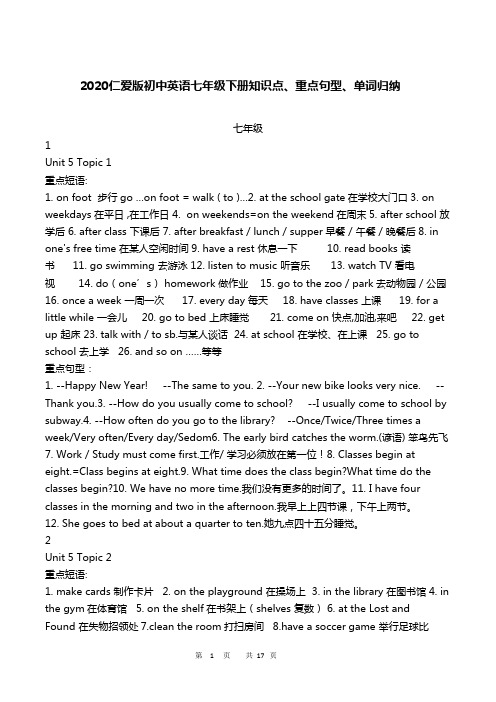
2020仁爱版初中英语七年级下册知识点、重点句型、单词归纳七年级1Unit 5 Topic 1重点短语:1. on foot 步行go …on foot = walk ( to )…2. at the school gate在学校大门口3. on weekdays在平日 ,在工作日4. on weekends=on the weekend在周末5. after school 放学后6. after class 下课后7. after breakfast / lunch / supper早餐 / 午餐 / 晚餐后8. in one's free time在某人空闲时间9. have a rest 休息一下 10. read books 读书 11. go swimming 去游泳 12. listen to music 听音乐 13. watch TV 看电视 14. do(one’s) homework 做作业 15. go to the zoo / park去动物园 / 公园16. once a week 一周一次 17. every day 每天 18. have classes 上课 19. for a little while 一会儿 20. go to bed 上床睡觉 21. come on 快点,加油,来吧 22. get up 起床 23. talk with / to sb.与某人谈话 24. at school 在学校、在上课 25. go to school 去上学 26. and so on ……等等重点句型:1. --Happy New Year! --The same to you.2. --Your new bike looks very nice. --Thank you.3. --How do you usually come to school? --I usually come to school by subway.4. --How often do you go to the library? --Once/Twice/Three times a week/Very often/Every day/Sedom6. The early bird catches the worm.(谚语) 笨鸟先飞7. Work / Study must come first.工作/ 学习必须放在第一位!8. Classes begin at eight.=Class begins at eight.9. What time does the class begin?What time do the classes begin?10. We have no more time.我们没有更多的时间了。


八年级人教版英语u5知识点Unit 5词汇:1. edition n.版本;版次2. achieve v.达到,实现3. concentrate v.集中,全神贯注4. purpose n.目的,意图5. measure v.测量6. furniture n.家具7. block n.街区8. rent n.租金9. slightly adv.轻微地,稍微10. expect v.期望,预期11. culture n.文化12. entire adj.全部的,整个的13. invest v.投资14. feature n.特征,特色15. equal adj.相等的,平等的Unit 5语法:1. 一般过去时态一般过去时态是描述过去发生的事情,叙述的是“过去的事情”。
“一般过去时”无需判断所述事件是完成了还是正在进行(一般将其和过去延续性动作区分),仅仅是强调事情是发生在过去的。
如:I studied Chinese two years ago. (我两年前学过中文。
)He was at home yesterday afternoon. (昨天下午他在家里。
)2. 特殊疑问句特殊疑问句是指以特殊疑问词开头,句子以问号结尾的句子。
其特点是:疑问词起到具体化和限制的作用,一般具有7个基本疑问词:who (谁), what (什么), when (什么时候), where (哪里), why (为什么), how (怎么), how many (多少) 。
如:What book did you buy? (你买了什么书?)Where did you go last weekend? (上个周末你去哪里了?)Who is your best friend? (你最好的朋友是谁?)3. 现在完成时态现在完成时态采用“have / has + 过去分词”的结构。
现在完成时反映目前的状态的来源是过去发生的事情。
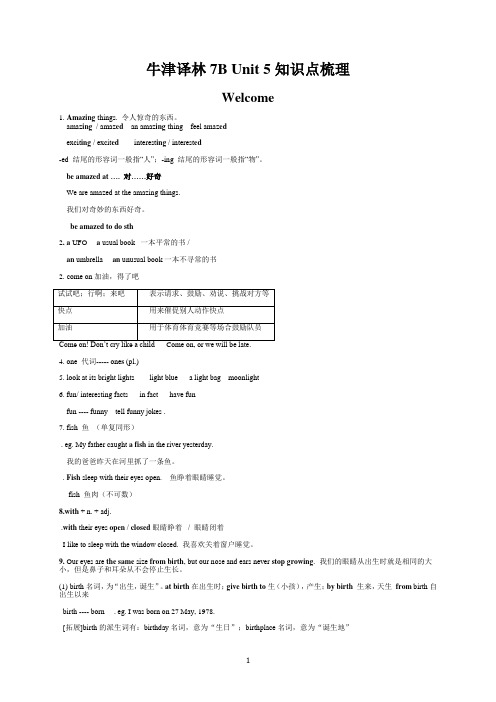
牛津译林7B Unit 5知识点梳理Welcome1.Amazing things. 令人惊奇的东西。
amaz ing / amaz ed an amaz ing thing feel amaz edexcit ing / excit ed interest ing / interest ed-ed 结尾的形容词一般指“人”;-ing 结尾的形容词一般指“物”。
be amazed at ….对……好奇We are amazed at the amazing things.我们对奇妙的东西好奇。
be amazed to do sth2. a UFO a usual book 一本平常的书 /an umbrella an unusual book 一本不寻常的书e on 加油,得了吧4. one 代词----- one s (pl.)5. look at its bright lights light blue a light bag moonlight6. fun/ interesting facts in fact have funfun ---- funny tell funny jokes .7. fish 鱼(单复同形). eg. My father caught a fish in the river yesterday.我的爸爸昨天在河里抓了一条鱼。
. Fish sleep with their eyes open. 鱼睁着眼睛睡觉。
fish 鱼肉(不可数)8.with + n. + adj..with their eyes open / closed眼睛睁着 / 眼睛闭着I like to sleep with the window closed. 我喜欢关着窗户睡觉。
9. Our eyes are the same size from birth, but our nose and ears never stop growing.我们的眼睛从出生时就是相同的大小,但是鼻子和耳朵从不会停止生长。
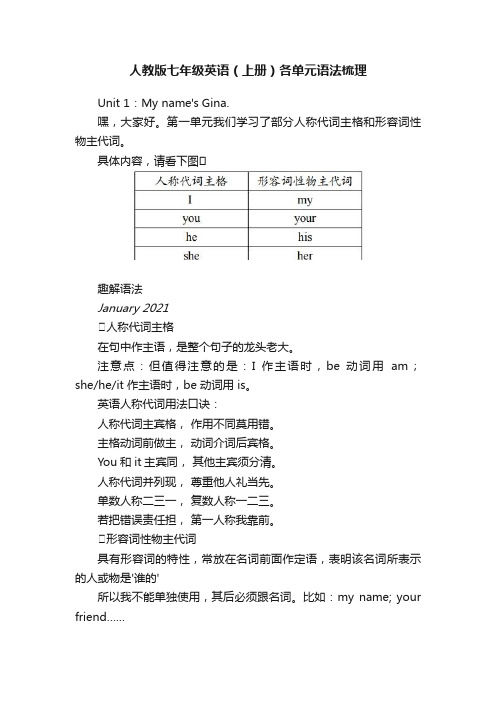
人教版七年级英语(上册)各单元语法梳理Unit 1:My name's Gina.嘿,大家好。
第一单元我们学习了部分人称代词主格和形容词性物主代词。
具体内容,请看下图趣解语法January 2021✍人称代词主格在句中作主语,是整个句子的龙头老大。
注意点:但值得注意的是:I 作主语时,be 动词用am;she/he/it 作主语时,be 动词用 is。
英语人称代词用法口诀:人称代词主宾格,作用不同莫用错。
主格动词前做主,动词介词后宾格。
You和it主宾同,其他主宾须分清。
人称代词并列现,尊重他人礼当先。
单数人称二三一,复数人称一二三。
若把错误责任担,第一人称我靠前。
✍形容词性物主代词具有形容词的特性,常放在名词前面作定语,表明该名词所表示的人或物是'谁的'所以我不能单独使用,其后必须跟名词。
比如:my name; your friend……英语物主代词用法口诀:物主代词分两种,形容词性名词性。
形容词性能力差,自己不能来当家。
句子当中作定语,身后定把名词加。
物主代词名词性,相当名词可单用。
句中充当主宾表,身后没有名词影。
两种代词形不同,添个 s 形变名。
his,its不用变,my变mine要记清。
话不多说,我们给大家来一些例证吧!✍经典例句1人称代词主格1. I am a girl. 我是一个女孩。
2. He/She is my friend. 他/她是我的朋友。
3. You are very nice. 你非常好。
4. It is a bed. 它是一张床。
2形容词性物主代词5. My name is Mary. 我的名字叫玛丽。
6. Your room is so tidy. 你的房间很整洁。
7. This is his/her pen. 这是他/她的钢笔。
8. That is my dog. Its name is Susan.那是我的狗。
它的名字叫苏珊。
9.He's a student. His mother is a teacher.他是一名学生。